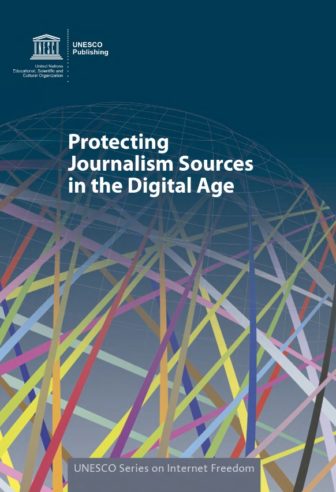
Image credit: chainstogains.com
From Watergate to the Panama Papers, investigative journalism that relies on confidential sources and whistleblowers has proven essential to the maintenance of democracies and open societies internationally.
One of the central ethical tenets of professional journalism is “first, protect your sources.” This principle is enshrined in professional codes internationally, while laws have been developed over decades to support this ethical commitment. In the analog era, such normative and regulatory frameworks enabled journalists to stand up in court – sometimes on pain of jail – and refuse to reveal their sources.
But Digital Age threats, like the the “trumping effect” of national security overreach, the ever-widening nets woven by mass and targeted surveillance and attempts by governments to undermine encryption, have thrown up a host of new risks for journalists and human rights defenders working with whistleblowers. That’s a development acknowledged by Pulitzer Prize-winning investigative journalist James Risen.
“It’s obviously becoming more dangerous today to do good investigative reporting anywhere in the world,” Risen said, speaking at the recent launch of a new action-research project designed to better equip reporters to deal ethically and responsibly with whistleblowers in the post-Snowden era.
Ethics of Source Protection in the Digital Age
 The emergence of these urgent new threats was mapped in the global study I led for UNESCO, Protecting Journalism Sources in the Digital Age, which was published last World Press Freedom Day. The recommendations from that study included a call for journalists and media organisations to:
The emergence of these urgent new threats was mapped in the global study I led for UNESCO, Protecting Journalism Sources in the Digital Age, which was published last World Press Freedom Day. The recommendations from that study included a call for journalists and media organisations to:
Consider providing technical advice and training to sources to ensure secure communications, with the assistance of NGOs and representative organisations.
And civil society organisations were called on to:
Invest in, and partner with, news publishers and academia to research and develop new tools to aid secure digital communication between journalistic actors and their sources.
Fast forward a year, and the NGO Blueprint For Free Speech has been funded by the Open Society Foundations to develop a set of best practice principles and guidelines for journalists working with whistleblowers globally. I’m leading the project for Blueprint with Dr. Suelette Dreyfus and our project partners include the Reuters Institute for the Study of Journalism (RISJ), the International Center For Journalists (ICFJ), and the World Editors Forum within the World Association of News Publishers (WAN-IFRA)*.
The plan is to engage journalists and editors globally through a newly launched survey, interviews and roundtable discussions to ensure the collaborative development of a universally useful set of guidelines and principles. These will be published online and in print as “Working With Whistleblowers: A Handbook for Journalists,” later this year.
Guidelines for Working with Whistleblowers

Working With Whistleblowers: The project at the International Journalism Festival. From left to right: Julie Posetti (RISJ), Philip Di Salvo (Universita della Svizzera/EJO), Joseph Cox (Motherboard). Photo: © Ireneo Alessi
We launched the Working With Whistleblowers initiative at the International Journalism Festival in Perugia last month with a public consultation and an invitation-only research roundtable discussion involving some of the world’s most high-impact investigative journalists, along with the leaders of organisations that support them.
Risen, a former New York Times national security correspondent who faced jail as he fought to protect his sources from exposure in a long-running court case, now leads national security reporting for The Intercept. He launched the Perugia consultation, welcoming the project and its aims. He also highlighted the need to treat whistleblowers with respect and dignity, and the importance of continuing to build digital defense capability among journalists and sources. But he also drew attention to the need for journalists to revert to analog-era basics.
“The ability by governments to track reporters and their sources is largely cyber,” Risen said. “And so the degree to which you learn to meet sources in person and get off the grid, and actually talk to people face-to-face is going to be key to continuing to help – it’s the first step you have to take to protect your source.”
Challenges raised by other participants in the Perugia consultations – including journalists and editors from The New York Times, The Guardian, El Mundo, Rappler, Le Soir and Pro Publica – ranged from the need to develop scalable encryption skills, to new threats posed by malicious hackers seeking to deliberately pollute large data drops with disinformation, and questions around the sustainability of the ethical commitment to protect sources in the Digital Age.
20 Draft Principles
So far, we have pulled together 20 draft principles and guidelines which we ultimately plan to augment with explanatory notes, case studies and practical resources. But we need the help of a broad range of international journalists, news organisations, industry bodies and relevant experts to distill, refine and adapt them first. So, what do you think? Here they are:
- First, protect your sources.
- Recognize the costs of whistleblowing for the whistleblower.
- Defend anonymity when it is requested.
- Undertake a digital risk assessment on every story involving a confidential source or whistleblower.
- Take responsibility for your digital defense and data hygiene.
- Embrace and use encryption.
- Defend encryption as a human right connected to freedom of expression and access to information.
- On sensitive stories, train your whistleblowers in basic digital security with regard to “data at rest.”
- On sensitive stories, train your whistleblowers in basic digital security with regard to “data in transit.”
- Publish original documents where possible and safe to do so.
- Recognize the importance of data sets as “stories.”
- Publish the data sets in their entirety where resources permit and it is safe to do so.
- Delete data provided by sources, when asked to protect the sources, consistent with ethical, legal and employer obligations.
- Delete data that you no longer need, and do it securely.
- Ensure any digital drop boxes for sources and whistleblowers offer a good level of security, and, for high-risk materials, anonymity and security.
- Verify material focusing on the public interest value of the information, not on your view of the attitudes or opinions of the source or whistleblower.
- Actively encourage your organization to provide proper data security for journalists, sources and stored materials, along with appropriate training for journalists.
- For high-risk whistleblowers, prompt them to think through how they will cope when the story breaks, ahead of time.
- Understand the country, regional and international legal and regulatory frameworks for protecting confidential sources and whistleblowers.
- Explain the risks of digital exposure to your sources/whistleblowers in line with your ethical obligations to protect them.
What have we missed? What’s problematic? What resources and tools would you like to accompany this handbook? Please make your voice heard and your experience count by completing this survey.
This post first appeared on the European Journalism Observatory website and is cross-posted here with permission.
 Julie Posetti is a multi award-winning Australian journalist and academic. She has recently been appointed senior research fellow at Oxford University’s Reuters Center for the Study of Journalism where she will lead the Institute’s new Journalism Innovation Project.
Julie Posetti is a multi award-winning Australian journalist and academic. She has recently been appointed senior research fellow at Oxford University’s Reuters Center for the Study of Journalism where she will lead the Institute’s new Journalism Innovation Project.
